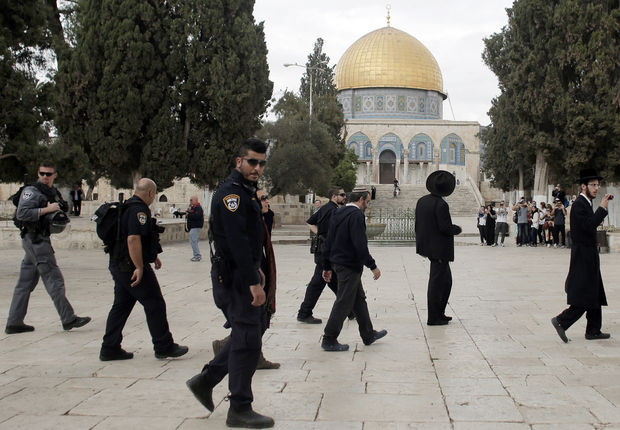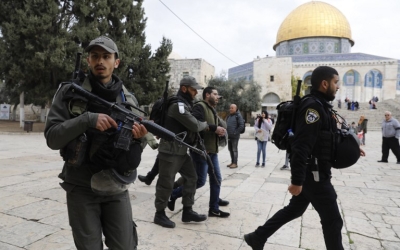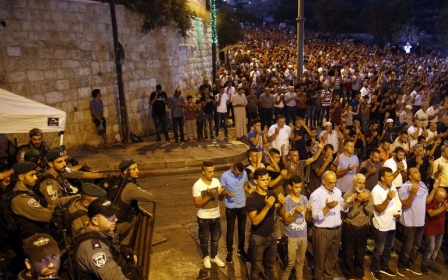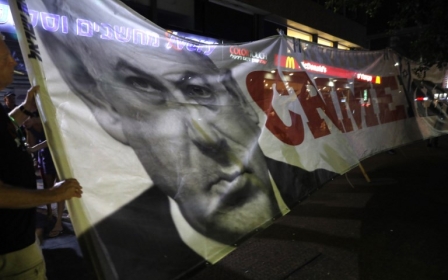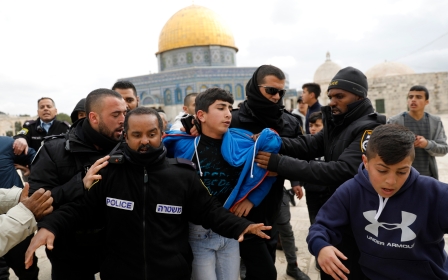The struggle for al-Aqsa: Palestinians have 'no one but God to help them'
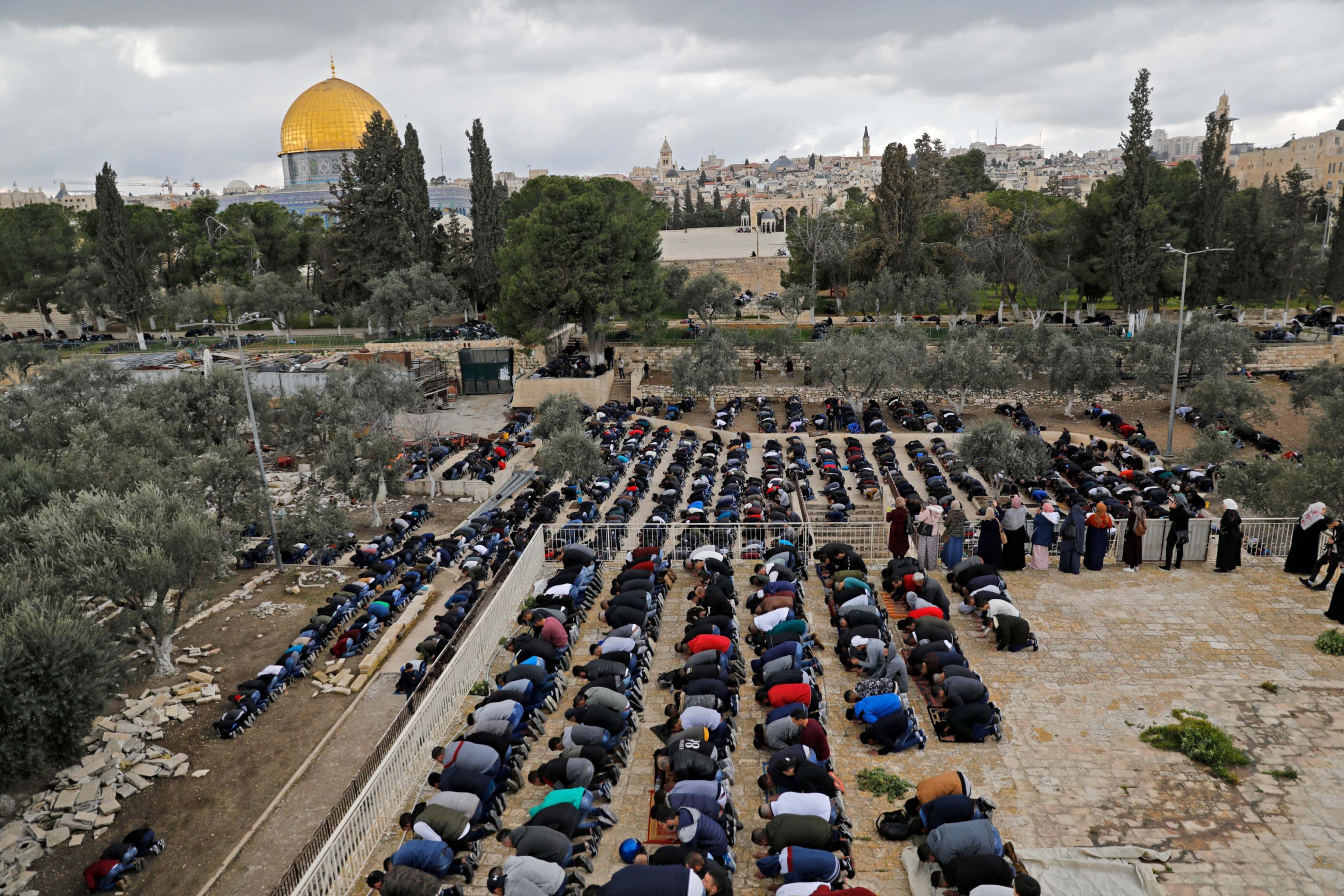
Jerusalem, the city of peace that knows no peace, is once again in the grip of crisis.
This happens so often that it has become almost a normal part of Jerusalem life. Few bother to even report on the latest clashes, let alone do anything about them.
The recurrent violations of international and human rights law, and the damage to Jerusalem's architecture and history at the hands of Israel, are indisputable - as is the fact that these crimes are being committed in a city of unique global significance, the spiritual centre of the three Abrahamic faiths.
Bab al-Rahma crisis
The latest crisis concerns Bab al-Rahma (the Gate of Mercy), a gate in the Haram al-Sharif Compound (Temple Mount) close to al-Aqsa mosque, which Israel unlawfully closed in 2003, claiming that the Islamic authority administering it at the time was associated with Hamas. Waqf authorities have repeatedly protested against the closure, asserting that the guards in charge of the gate had been replaced and it should be reopened.
New MEE newsletter: Jerusalem Dispatch
Sign up to get the latest insights and analysis on Israel-Palestine, alongside Turkey Unpacked and other MEE newsletters
Each Friday, Palestinian worshippers have underlined this protest by praying in front of Bab al-Rahma. On 22 February, hundreds managed to break through the gate and pray on the other side.
Israeli soldiers constantly patrol the compound, not hesitating to fire stun grenades or tear gas to disperse crowds of worshippers
Given Israel's heavily armed soldiers, trigger-happy at the best of times, this heroic act of resistance ranks alongside many others in Palestinians' unequal struggle to defend their rights. In the summer of 2017, Israel installed turnstiles with metal detectors at the entrances to the Haram al-Sharif, an act whose sacrilege outraged Muslims everywhere.
Thousands of defiant Palestinian worshippers continued to pray outside the turnstiles, undeterred by troops primed to shoot or arrest them. In the end, Israel gave in and the metal detectors were removed.
Most of the time, however, Israel's army has the upper hand at the compound - a slap in the face to Jordan, the custodian of Jerusalem’s Islamic holy sites. The 1994 Israel-Jordan peace treaty stipulated that Jordan would be the custodian of the Islamic holy sites in Jerusalem.
The eight Waqf officials who manage the Haram al-Sharif are all appointed by Jordan, a number set to increase to 18. On Sunday, Israel arrested the head of the Waqf and his deputy, albeit briefly, and Israeli forces consistently subject them and their colleagues to intimidation and threats.
The Third Temple
Israeli soldiers constantly patrol the compound, not hesitating to fire stun grenades or tear gas to disperse crowds of worshippers. Israel can close major mosques at a whim for hours. Ultra-religious settlers are allowed to target al-Aqsa for Jewish religious rituals, while settler break-ins to the compound are common. At the same time, fanatical Jewish organisations, such as the Temple Mount Faithful, aim to rebuild the Third Temple at the site.
On a visit to al-Aqsa in 2017, I saw these aggressive settlers swaggering around the mosque with their guards, as if they owned the place. The spectacle of menacing, black-clad men and armed soldiers brandishing their weapons inside such a holy place was unforgettable. It was one of the most upsetting things I have ever seen.
Israel's religious violations come against a long background of extensive civic oppression of Palestinians in Jerusalem. An array of laws and practices have been introduced since 1967 to designate these Palestinians as unwanted immigrants in their own city, aiming to induce them to leave and to convert what was once an Arab city into a wholly Jewish one.
To that end, the period between 1967 and 2016 saw more than 14,595 Palestinians lose their residency rights in East Jerusalem - a slow ethnic cleansing that continues unabated. Tens of thousands of Jewish settlers have been implanted around Jerusalem, with some infiltrating Arab neighbourhoods, including the Old City’s Muslim Quarter.
Theft of private land
Palestinian development is limited by Israel’s ongoing theft of private land, restrictions on building permits, poor infrastructure, and demolitions of "illegal" homes built by desperate Palestinians trying to accommodate their families. East Jerusalem, once vitally linked to the West Bank, is now cut off from it by the separation wall and visitor permit restrictions.
Ever since 1967, when Israel seized East Jerusalem, it has steadily and in broad daylight consolidated its hold on the holy city. No one has been able or willing to stop it. Yet, the Islamic world never tires of trumpeting its allegiance to Jerusalem, and Christians everywhere will soon mark Easter, when Jesus died and was resurrected in Jerusalem. Muslims worldwide look to al-Aqsa Mosque as a beacon of their faith.
They name their daughters, even hospitals and universities, "Isra," in reference to the Prophet Mohammed's miraculous night journey to Jerusalem. The first Qibla, or direction of prayer, in Islam was towards Jerusalem. Today, it is the second Qibla after Mecca.
Long before US President Donald Trump's recognition of Jerusalem as Israel’s capital last May, neither Christians nor Muslims acted effectively to protect Jerusalem from Israel's ravages. On the contrary, Saudi Arabia, supposedly Islam's supreme protector, is today a friend of Israel and a political partner in its schemes. Watching this unfold, other Arabs and Muslims seem paralysed, like rabbits caught in the headlights.
With friends like these, the Palestinians of Jerusalem have no choice but to bravely fight on alone. As the Arab saying goes: "They have no one but God to help them."
The views expressed in this article belong to the author and do not necessarily reflect the editorial policy of Middle East Eye.
Middle East Eye delivers independent and unrivalled coverage and analysis of the Middle East, North Africa and beyond. To learn more about republishing this content and the associated fees, please fill out this form. More about MEE can be found here.



